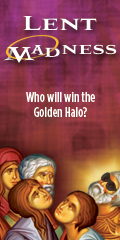I invite you to participate in Lent Madness, a great way to learn about the saints of the church.
What is Lent Madness? From their website...
Lent Madness began in 2010 as the brainchild of the Rev. Tim Schenck. In seeking a fun, engaging way for people to learn about the men and women comprising the Church’s Calendar of Saints, Tim came up with this unique Lenten devotion. Combining his love of sports with his passion for the lives of the saints, Lent Madness was born on his blog “Clergy Family Confidential.”
The format is straightforward: 32 saints are placed into a tournament-like single elimination bracket. Each pairing remains open for a set period of time and people vote for their favorite saint. 16 saints make it to the Round of the Saintly Sixteen; eight advance to the Round of the Elate Eight; four make it to the Final Four; two to the Championship; and the winner is awarded the coveted Golden Halo. The first round consists of basic biographical information about each of the 32 saints. Things get a bit more interesting in the subsequent rounds as we offer quotes and quirks, explore legends, and even move into the area of saintly kitsch.
The major change from 2010 to 2011 was the introduction of four “celebrity bloggers” to champion particular saints through the Final Four. Meredith Gould, Scott Gunn, Penny Nash, and Neil Alan Willard dove into the spirit of Lent Madness with abandon adding even more intrigue to the proceedings.
This year we have partnered with Forward Movement and Executive Director Scott Gunn to create our own website and broaden the number of people involved in the selection and writing process. We hope this will make Lent Madness 2012 even more lively, allow more voices to be heard, and broaden the audience of this Lenten discipline. What won’t change is the essence of Lent Madness: allowing people to get to know some amazing people who have come before us in the faith and reminding one another that there’s no reason for a dreary Lenten discipline. If this helps people connect with the risen Christ during this season of penitence and renewal, and have a bit of fun in the process, then it continues to be worthwhile.We hope you’ll participate fully this Lent and vote with reckless abandon! (Once — this isn’t Chicago).
I am reading the ebook from Forward Movement on the Saints. Very helpful!
Join in the fun! So I far picked 2 of the first 3 right. Still can't understand how Lancelot Andrews lost to that harlot, er, I mean, St. Joan of Arc.
Lent Madness can be found here.

